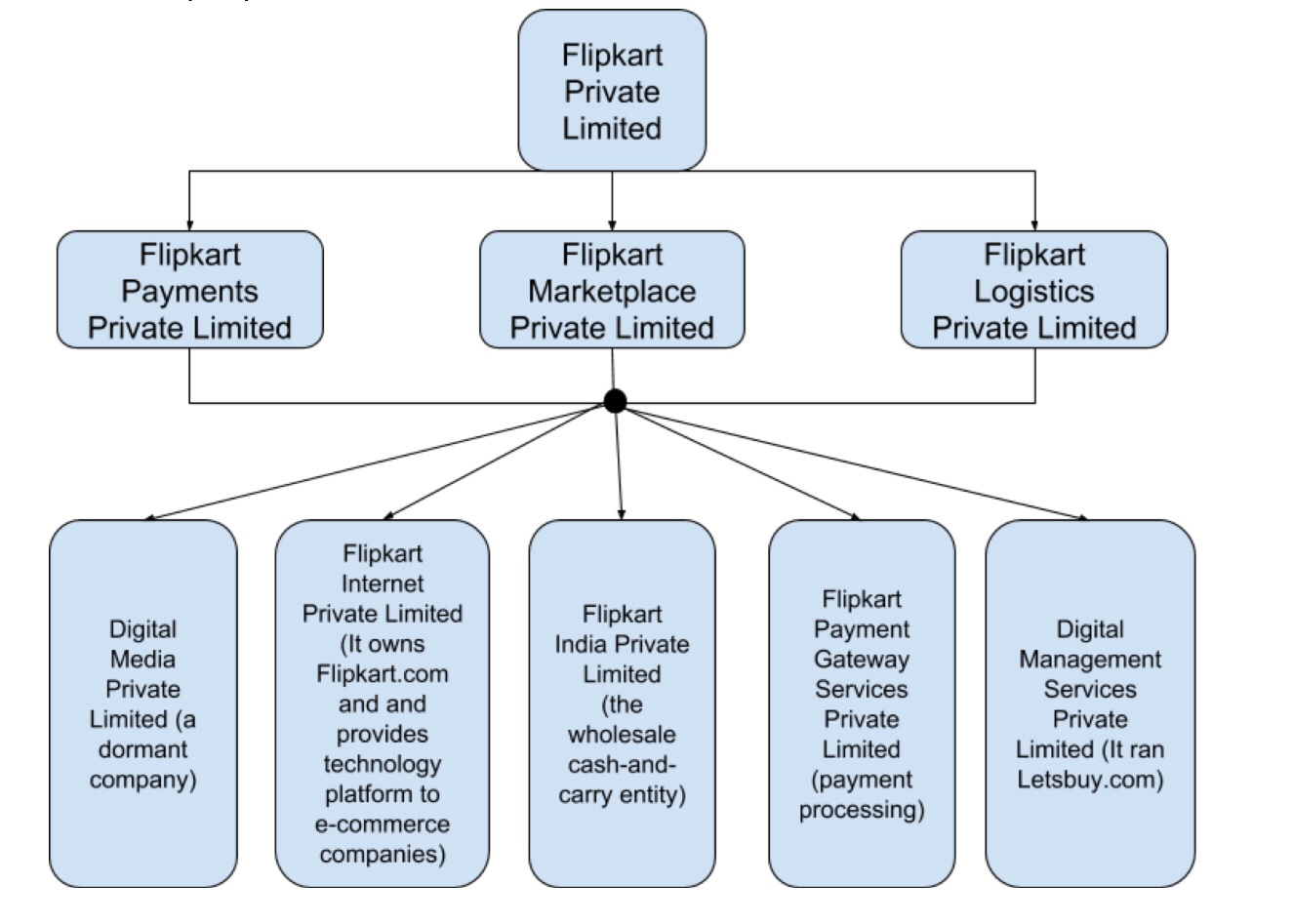In this article, Swati Garg, an Advocate and an LL.M. graduate from Gujarat National Law University discusses FDI in single brand, multi-brand retail and e-commerce.
Single Brand Retail Trading
Single brand retail trading means selling different products under one brand name. For example, Starbucks sells beverages and food items under the brand of Starbucks. It also sells cups under the same brand name. Other examples could be Ikea, Nike, Adidas etc.
As per the latest policy issued by Department of Industrial Policy and Promotion (DIPP), 100% foreign direct investment (FDI) is allowed in case of single brand retail through automatic route. Only those products that are branded during manufacturing and also sold under the same brand in other countries will be covered under this.
However, where the FDI is more than 51%, at least 30% of the value of goods should be sourced from India. This was in view to promote domestic sectors in India i.e. micro, small and medium enterprises, village and cottage industries, artisans and craftsmen. As a relief to the companies, in the initial five years, this requirement has to be made as an average of total value of goods purchased in the five years. After that, every year 30% requirement has to be completed.
E-commerce stores of single brand retailers
The policy also allows a single brand retail entity which is operating through brick and mortar stores, to trade through e-commerce. Indian entity has to make sure that all the compliances has been fulfilled whereas the investing entity will be responsible to file the evidence with RBI to prove the effective compliance.
Multi Brand Retail Trading
Multi-brand retail trading is selling products of different brands under one roof. For example, Big Bazar, Reliance, Shopper Stop etc. These establishments sell products of different brands at one establishment. With regards to multi brand retail trading, the central government has just framed an enabling policy specifying the maximum FDI which is allowed and the procedure. States/Union Territories’ governments have been given the ultimate authority to allow or reject this policy. Till date, 12 States/Union Territories have agreed to the central government policy.
As per the central government, only 51% FDI is allowed and for that also, one needs permission from government unlike in the case of single brand retail trading where only compliances has to be proved; no permission from any governmental authority is required. There are certain conditions over 51% cap which are explained as below:
- A minimum amount of US $ 100 million i.e. approx 700 crores INR has to be invested in India. They can only open their establishments/stores in an area having minimum 10 lakhs population.
- 50% of total FDI has to be invested in ‘back-end infrastructure’ within three years. Back- end infrastructure as defined in the policy will include capital expenditure on all activities, excluding that on front-end units. Back-end infrastructure will include processing, manufacturing, distribution, design improvement, quality control, packaging, logistics, storage, ware-house, agriculture market produce infrastructure etc.
- 30% of the goods should at least be procured from Indian domestic sector especially in micro, small and medium enterprises, agricultural co-operatives and farmers co-operatives. Even if an enterprise during the course of sourcing the goods stops being micro, small or medium enterprises, they will still be considered as small enterprises. Process of determination is same as in single-brand retail.
- Unlike single-brand retail trading, multi-brand retail traders are in no way allowed to trade by means of e-commerce.
- Fresh agricultural and meat produce sold at these multi-brand retail shops can be unbranded.
To what extent did liberalisation of FDI in multi-brand retail enable foreign players to enter India (if at all)?
As stated above, FDI in multi-brand retail is limited by various aspects. First of all, the particular State/UT has allowed the FDI in multi-brand retail trading. Secondly, only 51% FDI is allowed that too only after the approval of the government. Thirdly, there is a requirement of the investment of minimum US $100 million where 30% of the products has to be sourced from India. Moreover, they are not permitted to enter into e-commerce space. This situation has limited foreign brands to enter Indian market.
Another route which can be adopted to overcome this issue is Foreign Portfolio Investment (FPI). FPI is different from FDI. IN FPI, a foreign investor invests in the company’s stocks, bonds or securities. They do not have any control on the management and they can be liquidated in a shorter time frame than FDI.

Why the difference between FDI in single brand retail and multi-brand retail?
Indian marketplace is dominated with many small shops and business. If foreign investment in multi-brand retail is to be permitted, then the business of these small shop owners will be in danger. Consumers will be spoilt with choices and due to high competitions, prices will go down, thus these multi-brand retail establishment will be able attract consumers at a large scale.
However, in case of single-brand retail shops, they usually bring premium or luxury goods in the market so as such they are not in direct conflict with Indian small business.
FDI in e-commerce sector – Is it the same as multi-brand retail?
E-commerce retail trading is buying and selling of products and services online. There is no brick and mortar establishment. For example, Flipkart, Amazon, Tatacliq, etc.
Earlier, FDI in e-commerce would attract the norms on multi-brand retail, and so corporate lawyers started using a different kind of corporate structure for the transaction. They separated the technology and the trading company, and took investment in the technology company, and argued that there has been no investment in the retail sector.
Over time, RBI has separated the treatment of multi-brand brick and mortar stores and multi-brand e-commerce stores.
FDI in e-commerce retail trading is 100% through automatic route. That is just like in the case of single-brand retail trading, no permission from any governmental authority is required to invest in e-commerce retail trade whereas in multi-brand retail, as explained above, foreign investment can be done through government approval route only and that to upto 51%.
For example: If Walmart, which is a multi-brand retail store, was to open a store in India, it will need government approval and it can only invest up to 51%. Instead, if it invests in Flipkart under the regime for e-commerce companies, it can acquire up to 100% of it under the automatic route (provided that the structuring of Flipkart is in accordance with the FDI provision). Accordingly, it has acquired more than 75%.
How to structure an e-commerce venture to take foreign investment
100% foreign investment is allowed in marketplace model of e-commerce which is basically providing a platform online where a buyer can buy stuff from a seller. However, in case of inventory based model i.e. where e-commerce entity owns the products and services and directly sell to consumers, in this case FDI is not permitted.
Note: In case of FDI in wholesale business and single brand retail trading, they can use the digital platform to sell their products and services, implying they can have an inventory based model, provided they have a brick and mortar establishment. It is important to note down here that where FDI is in multi-brand retail traders, they are not allowed to to trade by means of e-commerce.
An e-commerce company needs to comply with the following conditions to receive FDI
- FDI in trading platform and technology services (including support services)
Foreign investors invest either in providing the trading platform or in technology services. For example, Amazon provides a trading platform for sellers to use to sell their goods to buy, with packaging, payment collection and logistics services. The platform cannot own any inventory of its own. An example for investment in technology services can be Walmart investing in Flipkart.
2. FDI in a B2B entity
In this case, a foreign investor invests in a B2B company which takes order from different B2C companies, totally unrelated to it. Even in case of sudden large orders, these B2B will be able to handle it more efficiently as they will have more resources to manage the trading and marketing of goods and services.
Other conditions under FDI Policy for receiving FDI in e-commerce
- Other than providing a platform to sell services and products, providing support services to sellers which can vary from, logistics, warehousing, to delivery, payment collection, call centre and other services is also permitted.
- More than 25% sale of a financial year from one particular vendor or its group of companies is also not permitted. For instance, till this regulation came into picture, on Flipkart, approximately 40% of revenue came from one particular vendor WS Retail. Similarly, on Amazon, its maximum revenue comes from Cloudtail. Now as per the policy, the revenue should not cross 25%.
- E-commerce entity can not exercise ownership over the products sold through its website as it will make it an inventory based model.
- Details of the seller has to be clearly provided on the website. And all the post selling customer satisfaction, guarantee/warranty of the product or services will be the responsibility of the seller.
- E-commerce entity should not influence the price of goods and services.
- All the payments made online has to be in conformity with the RBI guidelines.
Structure of Flipkart
Let’s take an example of Flipkart to understand how they are allowing FDI in their company’s model.

Flipkart Private Limited (FPL) is the holding company registered and incorporated in Singapore. Flipkart Payments Private Limited, Flipkart Marketplace Private Limited and Flipkart Logistics Private Limited are subsidiaries of FPL, also registered in Singapore. The last five companies are Indian companies in which subsidiaries of FPL invest.
As FDI is allowed in wholesale cash and carry, so there is Flipkart India Private Limited for the same. As FDI is allowed in providing technology platform, for that a Flipkart Internet Private Limited was established. Similarly for other things also. In this way flipkart is providing all the services by establishing different entities so that they can receive different FDIs.
Now let’s take a look at relation between Flipkart and WS RetaiL
| Timeline | FDI Policy | Flipkart |
| 2006 |
100% FDI in cash and carry allowed through automatic route 51% FDI in single brand retail through approval route |
Not incorporated |
| 2008 | Same as above | Incorporated. Operated as an inventory model of e-commerce business through its subsidiary WS Retail. |
| January 2012 |
100% FDI in cash and carry allowed through automatic route 100% FDI in single brand retail through approval route |
Same as above |
| September 2012 |
100% FDI in cash and carry allowed through automatic route 100% FDI in single brand retail through approval route 51% FDI in multi brand retail through approval route for B2B segment. (B2C is not permitted for single or multi brand retail companies with FDI) |
Starting February 2013, Flipkart shifted its model to marketplace model of e-commerce business. It sold WS retail and started acting as a platform where WS retail can sell its products to consumers. |
LawSikho has created a telegram group for exchanging legal knowledge, referrals and various opportunities. You can click on this link and join:
https://t.me/joinchat/J_
 Serato DJ Crack 2025Serato DJ PRO Crack
Serato DJ Crack 2025Serato DJ PRO Crack









 Allow notifications
Allow notifications



Hi
I would like to take your advice on the below mentioned query.
If a foreign brand (entity) opened up an Indian subsidiary (India entity) with physical office & warehouse and import stocks from its factory , will it be able to sale through Amazon & Flip kart directly by listing its product in its market place models. Or the Indian entity needs to go through a middle man like WS Retail to make it product sale at Flipkart
Best Regards
Purna
[…] Indian marketplace is dominated with many small shops and business. If foreign investment in multi-brand retail is to be permitted, then the business of these small shop owners will be in danger. Consumers will be spoilt with choices and due to high competitions, prices will go down, thus these multi-brand retail establishment will be able attract consumers at a large scale. However, in case of single-brand retail shops, they usually bring premium or luxury goods in the market so as such they are not in direct conflict with Indian small business. (blog.ipleaders.in) […]